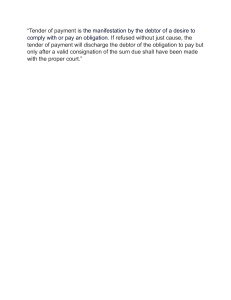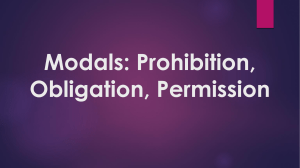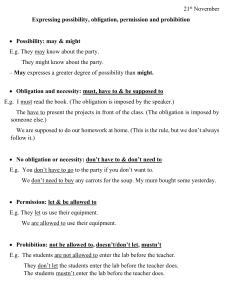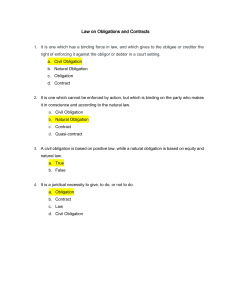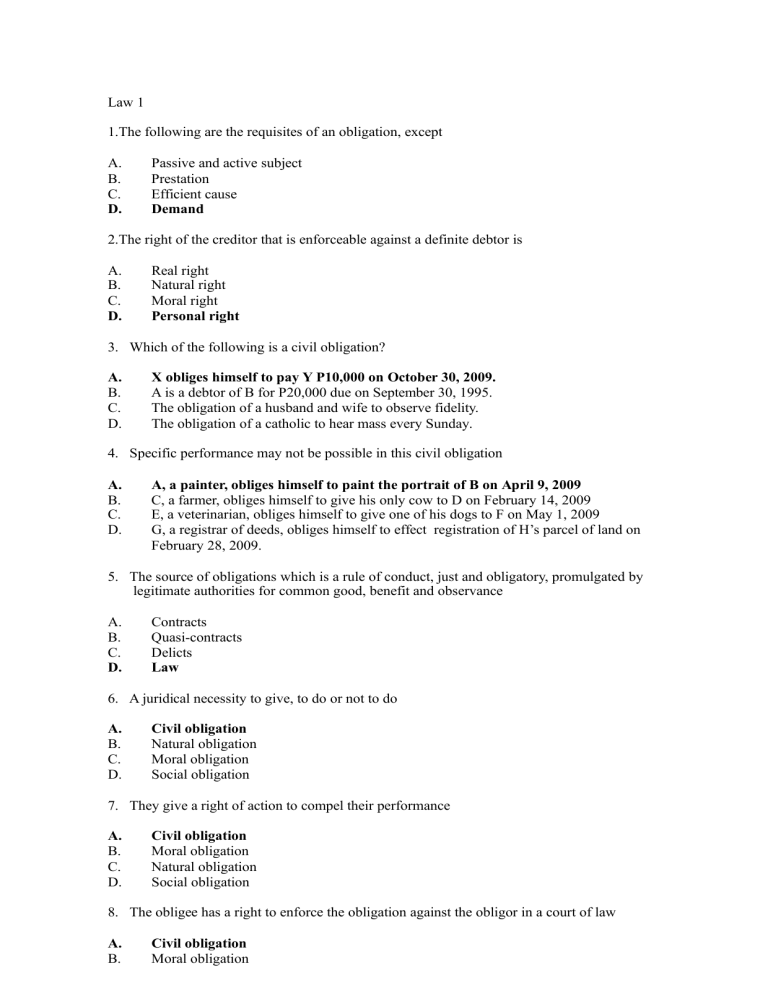
Law 1 1.The following are the requisites of an obligation, except A. B. C. D. Passive and active subject Prestation Efficient cause Demand 2.The right of the creditor that is enforceable against a definite debtor is A. B. C. D. Real right Natural right Moral right Personal right 3. Which of the following is a civil obligation? A. B. C. D. X obliges himself to pay Y P10,000 on October 30, 2009. A is a debtor of B for P20,000 due on September 30, 1995. The obligation of a husband and wife to observe fidelity. The obligation of a catholic to hear mass every Sunday. 4. Specific performance may not be possible in this civil obligation A. B. C. D. A, a painter, obliges himself to paint the portrait of B on April 9, 2009 C, a farmer, obliges himself to give his only cow to D on February 14, 2009 E, a veterinarian, obliges himself to give one of his dogs to F on May 1, 2009 G, a registrar of deeds, obliges himself to effect registration of H’s parcel of land on February 28, 2009. 5. The source of obligations which is a rule of conduct, just and obligatory, promulgated by legitimate authorities for common good, benefit and observance A. B. C. D. Contracts Quasi-contracts Delicts Law 6. A juridical necessity to give, to do or not to do A. B. C. D. Civil obligation Natural obligation Moral obligation Social obligation 7. They give a right of action to compel their performance A. B. C. D. Civil obligation Moral obligation Natural obligation Social obligation 8. The obligee has a right to enforce the obligation against the obligor in a court of law A. B. Civil obligation Moral obligation C. D. Natural obligation Social obligation 9. This is based on equity and justice A. B. C. D. Civil obligation Moral obligation Natural obligation Social obligation 10. The person in whose favor the obligation is constituted A. B. C. D. Obligor Obligee Passive subject Debtor 11. Synonymous to obligee 1. Creditor A. B. 2. Active subject 3. Debtor C. D. 1 and 2 1 and 4 4. Passive subject 2 and 3 3 and 4 12. The person who has the duty of giving, doing or not doing. A. B. Obligee Obligor C. D. Active subject Creditor 13. Synonymous to obligor 1. Creditor A. B. 2. Active subject 1 and 2 1 and 4 3. Debtor C. D. 4. Passive subject 2 and 3 3 and 4 14. The object or subject matter of the obligation A. B. Prestation Vinculum C. D. Active Subject Passive subject 15. The efficient cause or juridical tie why the obligation exists A. B. C. D. Active subject Passive subject Prestation Vinculum 16. The duty not to recover what has voluntarily been paid although payment was no longer required A. B. Civil obligation Natural obligation C. D. Moral obligation Juridical obligation 17. The following are sources of obligations derived from law, except A. contracts C. delicts B. quasi-contracts D. quasi-delicts 18. Cannot be enforced by court action and depend exclusively upon the good conscience of the debtor. A. B. civil obligation natural obligation C. D. moral obligation social obligation 19. A owes B P1,000. A, knowing that the debt has prescribed, nevertheless, still pays B. Can A recover what he voluntarily paid? First answer Second Answer A. B. C. D. Yes, because B has no right to demand the payment effected by A. No, the payment extinguished the natural obligation. Both answers are correct. Both answers are wrong. Only the first is correct. Only the second is correct. 20. The duty to pay taxes and support one’s family are obligations arising from A. B. C. D. Law Contracts Quasi-contracts Delicts 21. The obligation of husband and wife to render mutual help and support arises from A. B. C. D. Contract Law Quasi-contract Quasi-delict 22. A supports B, a minor, because B’s father refuses to support B. The father is obliged to reimburse A. The source of obligation is A. B. contracts quasi-contracts C. D. delicts quasi-delicts 23. A juridical relation resulting from a lawful, voluntary, and unilateral act and which has for its purpose the payment of indemnity to the end that no one shall be unjustly enriched or benefited at the expense of another. A. B. C. D. Contract Quasi-contract Delicts Quasi-delicts 24. When a person voluntarily takes charge of another’s abandoned business or property without the owner’s authority where reimbursement must be made for necessary and useful expenses. A. B. C. D. Quasi-contract quasi-delict Negotiorum gestio Solutio indebiti 25. When something is received when there is no right to demand it, and it was unduly delivered thru mistake, the recipient has the duty to return it. A. B. C. D. Quasi-contract Quasi-delict Negotiorum gestio Solutio indebiti 26. - A quasi-contract is an implied contract. - A defendant who is acquitted in a criminal case is no longer liable civilly. A. B. C. D. True; true True; false False; true False; false 27. Tort or culpa aquiliana is A. B. C. D. Quasi-contract Quasi-delict Negotiorum gestio Solutio indebiti 28. A fault or act or omission of care which causes damage to another, there being no preexisting contractual relations between the parties. A. B. C. D. Quasi-contract Quasi-delict Negotiorum gestio Solutio indebiti 29. Omission of the diligence which is required by the circumstances of person, place and time. A. B. C. D. Ignorance Negligence Impotence Insanity 30. Unless the law or the stipulation of the parties require another standard of care, every person obliged to give something is also obliged to take care of it with the proper diligence. A. B. C. D. Observing utmost care. Observing extraordinary diligence Of a father of a good family Observing ordinary diligence 31. Ordinary diligence is A. B. C. D. Diligence of a good father of a family. Extraordinary diligence Diligence required by law Diligence of a father of a good family. 32. The creditor has the right to the fruits of the thing. A. B. From the time the obligation to deliver it arises. From the time the fruits have been delivered. C. D. From the time there is meeting of the minds. From the perfection of the contract. 33. From the time the fruits have been delivered, the creditor shall acquire A. B. C. D. Real right Personal right Moral right Inchoate right 34. If A sells to B a fountain pen, the giving by A to B of the fountain pen is A. B. C. D. Actual tradition Constructive delivery Symbolical tradition Traditio longa-manu Items 35-39 A kind of constructive delivery whereby: 35. There is delivery when the keys of a warehouse are given. A. B. C. D. Traditio simbolica Traditio longa-manu Traditio brevi-manu Traditio constitotum possessorium 36. There is delivery by mere consent or pointing out of an object. A. Traditio simbolica B. Traditio longa-manu C. Traditio brevi-manu D. Traditio constitotum possessorium 37. A possessor of a thing not as an owner, becomes the possessor as owner. A. B. C. D. Traditio simbolica Traditio longa-manu Traditio brevi-manu Traditio constitotum possessorium 38. A possessor of a thing as an owner retains possession no longer as an owner, but in some other capacity A. B. C. D. Traditio simbolica Traditio longa-manu Traditio brevi-manu Traditio constitutom possessorium 39. The opposite of brevi-manu A. B. C. D. Longa-manu Simbolica Constitutom possessorium Quasi-tradition 40. If a thing is capable of particular designation. A. Generic B. C. D. Specific Indeterminate Indeterminable 41. If a thing refers to a class, to a genus and cannot be pointed out with particularity. A. B. C. D. Generic Specific Determinate Indeterminable 42. A wife was about to deliver a child. Her parents brought her to the hospital. Who should pay the expenses for medical attendance? Answer 1 – The husband, because it is his duty to support his wife and support includes medical attendance. Answer 2 – The parents, because they were the persons who brought the “wife” to the hospital. A. B. C. D. Both answers are correct. Both answers are not correct. Only the first is correct. Only the second is correct. 43. The following are kinds of fruits of an obligation, except A. B. C. D. natural industrial civil penal 44. Spontaneous products of the soil and the offspring and other products of animals A. B. C. D. 45. A. B. C. D. natural industrial civil penal Products of the soil through cultivation or intervention of human labor. natural industrial civil penal 46. Fruits arising out of contracts- like rental payments. A. B. C. D. 47. natural industrial civil penal When does the obligation to deliver arise? Answer 1 – If there is no term or condition, then from the perfection of the contract. Answer 2 – If there is a term or condition, then from the moment the term arrives or the condition happens. A. B. C. D. True; true True; false False; true False; false 48. A is obliged to give B 10 kilos of sugar, which of the following is not correct? A. B. C. D. B can demand that A obtain the sugar and deliver it to him. B can just buy 10 kilos of sugar and charge the expense to A. A can insist on just paying B damages or the monetary value of the sugar. B may require another person to deliver the sugar and charge the expenses to A. 49. Where demand by the creditor shall be necessary in order that delay may exist. A. B. C. D. When time is of the essence of the contract. When demand would be useless. When the obligor has expressly acknowledged that he is in default. When the obligor requested for an extension of time. 50. Debtor’s default in real obligation. A. B. C. D. Mora accipiendi Mora solvendi ex-re Mora solvendi ex-persona Compensatio morae 51. Debtor’s default in personal obligation. A. B. C. D. Mora accipiendi Mora solvendi ex-re Mora solvendi ex-persona Compensatio morae 52. Default on the part of the creditor A. B. C. D. Mora accipiendi Mora solvendi ex-re Mora solvendi ex-persona Compensatio morae 53. Default on the part of both parties. A. B. C. D. Mora accipiendi Mora solvendi ex-re Mora solvendi ex-persona Compensatio morae 54. A borrowed money from B payable on December 10, 2008. If A failed to pay on due date, will A be in delay? A. B. C. D. Yes, because there is stipulation as regards the due date. Yes, if the obligation is in writing. No, because demand has not been made by B. No, if A has the money to pay B. 55. Damages awarded for mental and physical anguish. A. B. C. D. Moral Exemplary Nominal Temperate 56. Damages awarded to vindicate a right. A. B. C. D. Liquidated Actual Nominal Exemplary 57. Damages awarded to set an example. A. B. C. D. Exemplary Liquidated Nominal Moral 58. When the exact amount of damages cannot be ascertained. A. B. C. D. Exemplary Liquidated Temperate Moral 59. Damages determined beforehand. A. B. C. D. Temperate Liquidated Actual Moral 60. A obliged himself to deliver to B the following: 1) 2008 Sing-It Yamaha Organ 2) Magalona passenger jeepney with engine No. 69 and chasis No. 88 First Statement- In case A failed to deliver the 2008 Yamaha Organ, the court may compel A to deliver the 2008 Yamaha Organ plus damages Second Statement - In case A failed to deliver the jeepney, the court may compel A to deliver the jeepney plus damages. A. B. C. D. True; true True; false False; true False; false 61. I – If a person obliged to do something fails to do it, the same shall be executed at his cost. II - Those who in the performance of their obligations are guilty of fraud, negligence, or delay and those who in any manner contravene the tenor threof, are liable for damages. A. B. C. True; true True; false False; true D. False; false 62. I - Responsibility arising from fraud is demandable in all obligations. Any waiver of an action for fraud is void. II – If the law or contract does not state the diligence which is to observed in the performance of an obligation, that which is expected of a father of a good family shall be required. A. B. C. D. True; true True; false False; true False; false 63. I – The receipt of a later installment of a debt without reservation as to prior installments, shall give rise to a rebuttable presumption that such installments have been paid. II – If a taxpayer pays his income tax liability for the current year, there is a presumption that tax liability for the previous year has been paid. A. B. C. D. True; true True; false False; true False; false 64. With regard to the right as to the fruits of the thing, which is not correct? A. B. C. D. If the obligation is subject to a suspensive condition, the obligation to deliver arises from the moment the condition happens. If the obligation is subject to a suspensive condition, the obligation to deliver arises upon the expiration of the term or period. If there is no condition or term for its fulfillment, the obligation to deliver arises from the perfection of the contract or creation of the obligation. If the obligation arises from the contract of sale, the vendor has a right to the fruits of the thing from the time the obligation to deliver arises. 65. A is obliged to deliver his only car to B on November 20, 2009. If A does not deliver, and on November 22, 2009, a typhoon destroys the car. A. B. C. D. A is not liable because the obligation is extinguished. A is liable because he is in delay. A and B will divide the loss equally. A’s obligation is converted into a monetary obligation. 66. I – When what is to be delivered is a determinate thing, the creditor may compel the debtor to make the delivery and if the debtor refuses, the creditor may ask that the obligation be complied with at the expense of the debtor. II – The obligation to give a determinate thing includes that of delivering all its accessions and accessories, even though they may not have been mentioned. A. B. C. D. True; true True; false False; true False; false 67. What is the basis of the liability of a school when a student is stabbed inside the campus by a stranger in the school? A. B. Contracts Quasi-contracts C. D. Delicts Quasi-delicts 68. The following except one, are included in civil liability. The exception is A. B. Restitution Reparation C. D. Indemnification Starvation 69. The thing itself shall be restored, as a rule A. B. Restitution Reparation C. D. Indemnification Starvation 70. The court determines the amount of damage taking into consideration the price of the thing and its sentimental value to the injured person. A. B. Restitution Reparation C. D. Indemnification Starvation 71. The consequential damages suffered by the injured person and those suffered by his family or third person by reason of the act. A. B. Restitution Reparation C. D. Indemnification Starvation 72. Action to impugn or rescind acts or contracts done by the debtor to defraud the creditors. A. B. C. D. Accion reinvindicatoria Accion pauliana Accion subrogatoria Accion quanti-minoris 73. A borrower agreed, that in case of non-payment of his debt, to render services as a servant. Which of the following is not correct? A. B. C. D. If the services will be rendered in satisfaction of the debt, the stipulation is valid. If the services will be “for free”, the stipulation is void for being contrary to law and morals. If the services will not be gratuitous, specific performance of the service will be the proper remedy in case of non-compliance. Should there be a valid stipulation as regards the rendition of services, an action for damages should be brought in case of non-compliance. 74. A ordered B, a 10 year old boy to climb a high and slippery mango tree with a promise to give him part of the fruits. B was seriously injured when he fell while climbing the tree. Is A liable? First Answer - No, because no person shall be responsible for fortuitous events. Second Answer – Yes, because A is negligent in making the order without taking due care to avoid a reasonable foreseeable injury to B. A. B. True; true True; false C. D. False; true False; false 75. A pays for B’s transportation fare, without B’s knowledge and later discovers that B was entitled to half-fare. Which is not correct? A. B. C. D. A can recover the half-fare from B. A can recover the half-fare from the carrier. A can recover the ½ from B and ½ from the carrier. A can recover half-fare from B only. 76. A borrowed P100,000 from B. the loan was secured by a mortgage of A’s land in favor of B. Without the knowledge of A, C paid B the sum of P100,000 for A’s debt. As a result A. B. C. D. 77. A. B. C. D. C may foreclose the mortgage on A’s land if A cannot pay. C cannot claim reimbursement from A in as much as the payment was made without the knowledge of B. C can recover the amount from B in case A refuses to reimburse C. The obligation of A to B was extinguished but A should reimburse C the amount of P100,000 because he was benefited by the payment. When the debtor of a debtor is ordered not to pay the latter so that preference would be given to the latter’s creditor. Garnishment Interpleader Injunction Attachment 78. A obtained a loan from B bank. The loan was embodied in several promissory notes. As security the borrower executed a chattel mortgage on his standing crops. Said crops were however subsequently destroyed by typhoon “Rosing”. Is A still liable for the loan despite the destruction of the crops by a fortuitous event? 1st Answer - Yes, the obligation of A was to deliver a generic thing – money. 2nd Answer – No, the obligation was to deliver determinate things – the standing crops. A. B. C. D. True; true True; false False; true False; false 79. A sold a half-interest in his specific car to B. It was agreed that the price to be paid by B would be used in installing a new engine on the car. Later, the car was destroyed by a fortuitous event. Is B’s obligation to pay the price extinguished? 1st Answer - Yes, there is no more use of installing a new engine since the car has already been destroyed by a fortuitous event. 2nd Answer – No, B must still pay because his obligation to pay in generic. A. B. C. D. True; true True; false False; true False; false 80. I – A commits the crime of theft and is asked to return the car to its owner B. If, before the car is delivered to B it is destroyed by a fortuitous event, Is A’s liability extinguished? II – Using above statement, A had previously asked the owner to accept the car, but the owner without any justifiable reason refuses to accept the car, and it is destroyed by a fortuitous event, Is A’s liability extinguished? A. B. C. D. Yes; Yes No; Yes Yes; No No; No 81. I - There is no delay in an obligation not to do something. II – Solutio indebiti and negotiorum gestio are implied contracts. A. B. C. D. True; true True; false False; true False; false 82. I - Consent of the parties is required in quasi-contract. II – The creditor acquires real rights over the thing from the time the obligation to deliver arises. A. B. True; true True; false C. D. False; true False; false 83. The creditor has a right to the fruits of the thing from the time A. B. C. D. The thing is delivered. The fruits are delivered. The obligation to deliver the thing arises. The sale is perfected. 84. The buyer has a right to the fruits of the thing from the time A. B. C. D. The thing is delivered. The fruits are delivered. The obligation to deliver the thing arises. The sale is perfected. 85. Which is not considered as quasi-contract? A. B. C. D. Solutio indebiti Negotiorum gestio When the third person with the knowledge of the debtor, pays the debt. Reimbursement due the person who saved property during fire or typhoon without the knowledge of the owner. 86. No longer enforceable by court action but is binding on the party who oblige with it in conscience is A. B. Civil obligation Natural obligation C. D. Moral obligation Conditional obligation 87. If A pays a debt that has prescribed 1. Not knowing it has prescribed, A can recover on the ground of undue payment. 2. Knowing it has prescribed, A cannot recover for this would be a case of natural obligation. A. B. Both 1 and 2 are true Only 1 is true C. D. Only 2 is true Both 1 and 2 are false 88. On June 24, 2009 A is obliged to give B his specific car. There was no delivery until June 30 when the garage of the car collapsed due to heavy rain and strong winds of Typhoon Ondoy, and the car was totally destroyed. Is A still liable? A. B. C. D. No, even if A was in default, he could plead impossibility of performance.] Yes, because the contract is perfected. No, because there was no demand by B to deliver the car. Yes, the obligation to deliver the car is changed to pay the equivalent value because B is in legal delay. 89. This obligation is demandable at once when it A. B. has a resolutory condition. has a suspensive condition C. D. is with a term ex-die. has a period. 90. When the debtor binds himself to pay when his means permit him to do so, the obligation shall be deemed to be with a A. B. Resolutory period Suspensive condition C. D. Potestative condition Period. 91. A promise to give B his Volvo car if B passes the CPA Board Exams. Pending the results of the exams, the car is destroyed by a fortuitous event without any fault on the part of A, As a result A. B. C. D. The obligation of A is extinguished. The obligation of A is converted into monetary obligation. The obligation of A will equitably reduced. A will have to give B another car of equivalent value. 92. A period with a suspensive effect. A. B. C. D. I will support you beginning January 1 of next year. I will support you until January 1 of next year. I will support you if A dies of TB. I will support you if A marries B. 93. A period with a resolutory effect. A. B. C. D. I will support you beginning January 1 of next year. I will support you until A dies. I will support you if A dies. I will support you if A dies of TB.
